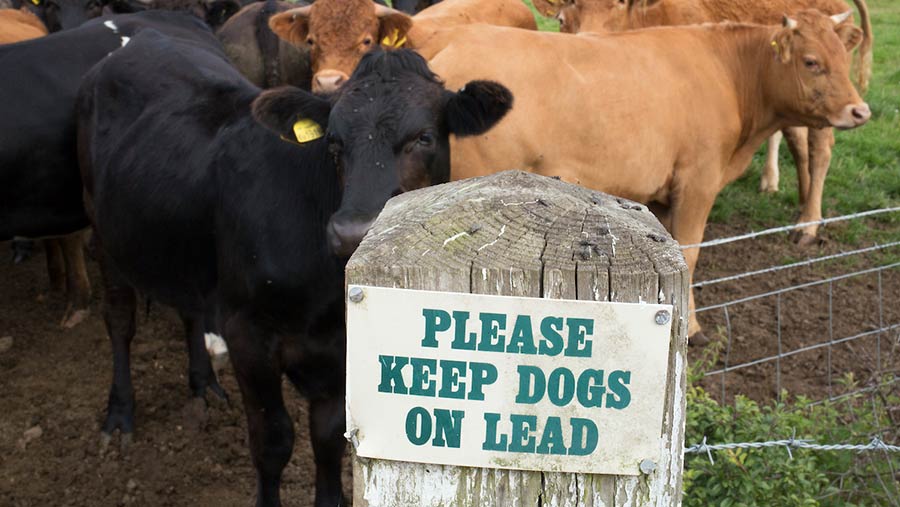The law on shooting dogs – critical facts farmers must know
 © Tim Scrivener
© Tim Scrivener Reports of dogs worrying and injuring livestock are widespread, so it’s important farmers and landowners know how to react if confronted by this difficult situation.
But your legal position if you encounter someone else’s dog(s) on your land is a grey area, particularly when it results in the dog being injured or killed.
The rights of farmers or landowners to take action are limited, and only extend to the use of legitimate and reasonable means.
Thrings solicitor Robert James considers some of the key legal points and assesses what they mean in practice.
See also: 116 sheep killed in ‘worst attack in living memory’
The civil law
- If a dog belonging to somewhere else enters a farmer’s land, it amounts to trespass. That said, responding by shooting and injuring or even killing a trespassing dog amounts to a civil wrong, which, in turn, could mean the farmer is liable to the dog owner. The key issue is whether the injuring act is a legitimate act or not.
- Compensation for injuries suffered to livestock is mainly governed by the Animals Act 1971. Where a dog causes damage by killing or injuring livestock, any person who is a keeper of the dog is strictly liable for the damage. This means that the liability will fall on the dog owner without the need to make a finding of fault. As such, the law is slanted in the farmer’s favour.
- The Act goes further, and provides statutory defence to farmers who injure a dog in order to protect their livestock.
- To be able to rely on the defence, farmers will need to demonstrate that:
(a) there are no reasonable means of preventing the worrying (or the dog has been worrying livestock);
(b) the dog has not left the vicinity;
(c) the dog is not under an individual’s control; and
(d) There are no practicable means of ascertaining its owner. What constitutes the necessary practical steps will depend on the circumstances, but it could extend to trying to ascertain whether anybody in the immediate vicinity is the owner, and who would have the ability to bring the dog back under control.
- In addition, if a dog is shot, it is crucial that the local police authorities are notified within 48 hours. This applies to killing or injuring, and it will not be a sufficient excuse to argue the farmer did not think they had killed the dog. Failure to do so will prevent the statutory defence being available.
- The defence does not apply to dogs which are authorised by the occupier to be on the land. In other words, the dog must be trespassing. This has significant implications if, for instance, a friend’s dog was invited onto the land which subsequently began worrying the farmer’s livestock.
- Ownership of the dog should be established where possible. Attempts should be made to call the dog’s owner, and/or, where possible, to wait for the owner to arrive.
- The above defence does not apply to all dogs: sheepdogs, police dogs, guide dogs, working gun dogs and pack hounds are all exempt and under no circumstances should be shot.
The criminal law
- The Animal Welfare Act 2006 makes it a criminal offence to cause unnecessary suffering to animals.
- As a criminal liability, breach of these provisions can have severe consequences, including up to six months’ imprisonment, fines of up to £20,000 and the possibility of being disqualified from keeping animals.
- The Act provides several factors to be considered, including whether the shooting could be avoided and whether it was for a legitimate purpose. For example, it is unlikely that shooting a dog for merely trespassing is a legitimate purpose. However, if that dog is threatening livestock, the protection of the livestock is likely to be a legitimate purpose. These provisions become particularly problematic if the dog is not killed with one clean shot, and it is important to avoid causing suffering to the animal wherever possible.
Other considerations
- Another issue to bear in mind is that use of a gun in these circumstances may lead to a review of the farmer’s firearms certificate. The shooting of a dog is itself not an automatic ground for revocation, but any review carries with it a risk (however small) that the firearms certificate may be revoked. Whilst it is possible to appeal the revocation, it could be an expensive avenue.
Practical tips
The best way to avoid the potential adverse consequences of dogs trespassing on a farmer’s land is to prevent it from happening in the first place. There are several practical steps farmers can take to prevent a situation like this arising, including:
- Ensuring adequate signage on the land, particularly where it is close to a public right of way, to ensure owners keep their dogs on leads when passing through. On a practical level, you may wish to write to the owners (if identifiable) if you have previously spotted their dog on your land.
- Maintain adequate land boundaries to prevent accidental trespassing, and/or fence footpaths.
- Change where animal feeders are placed, so that livestock congregates away from public pathways, reducing the risk of conflict.
* Robert James is an Associate Solicitor in the Agriculture team at Thrings

